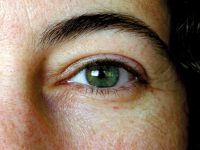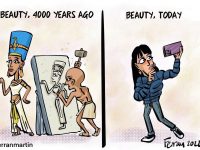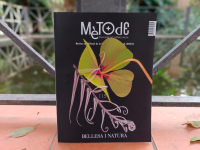New knowledge environments
On the possibility of a citizen social science
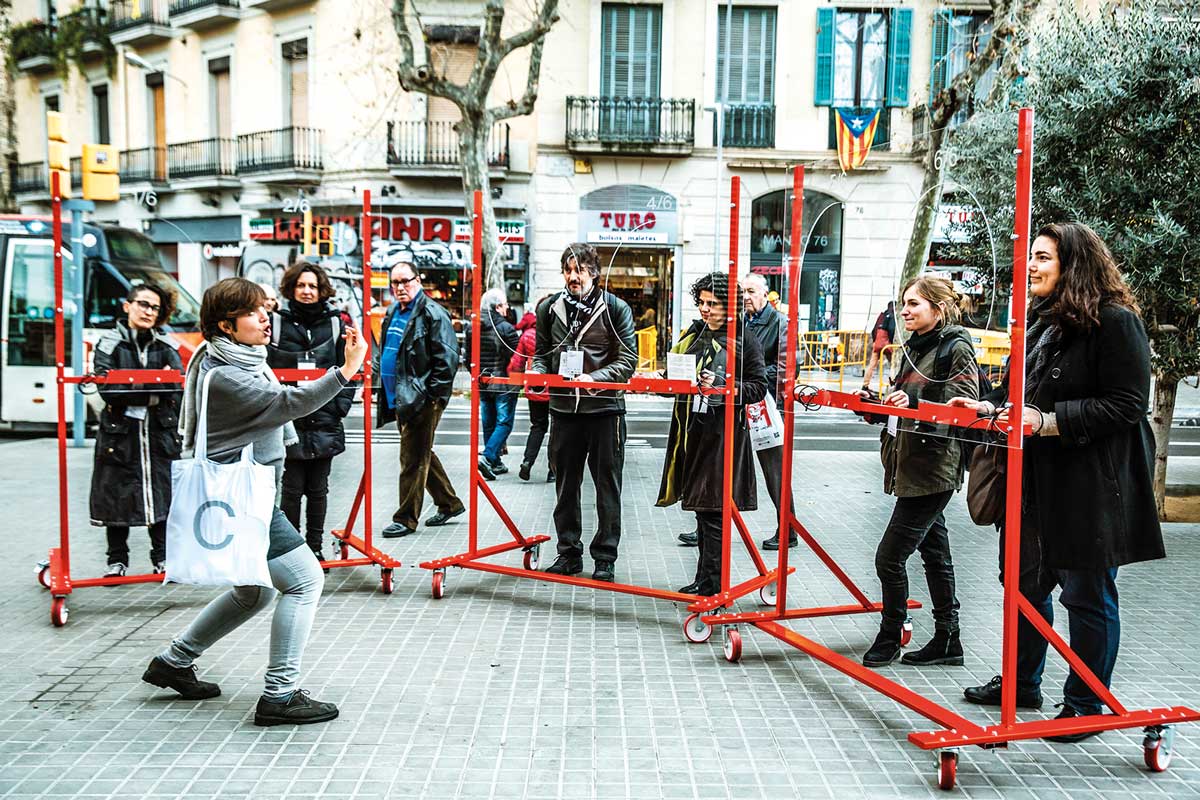
Citizen science is in a process of consolidation, with a wide variety of practices and perspectives. Social sciences and humanities occupy a small space despite the obvious social dimension of citizen science. In this sense, citizen social science can enrich the concept of citizen science both because the research objective can also be of a social nature and because it provides greater reflection on the active participation of individuals, groups, or communities in research projects. Based on different experiences, this paper proposes that citizen social science should have the capacity to empower participants and provide them with skills to promote collective actions or public policies based on a co-created knowledge.
Keywords: citizen science, citizen social science, vulnerable groups, empowerment, transformative science.
Citizen science is commonly recognised as the participation of the public in scientific research (Vohland et al., 2021). It has been promoted as a way to collect massive amounts of data and accelerate its processing, while also raising awareness and spreading knowledge and a better understanding of both scientific methods and the social relevance of results (Parrish et al., 2019). Some researchers support the idea of maintaining the generality and vagueness of the term citizen science (Auerbach et al., 2019), due to the youth of the discipline and the different ways it can be understood (Haklay et al., 2020). Such diversity can be considered positively, as a way to enrich citizen science and, more generally, as a catalyst for the emergence of trans-disciplinary and transformative science.
The sociologist Alan Irwin, one of the authors to whom we owe the concept, already said over 25 years ago: «Citizen Science evokes a science which assists the needs and concerns of citizens» (Irwin, 1995, p. xi). The book argues that citizens can create reliable knowledge. However, decades later, the number of contributions using the term citizen science in social sciences and humanities is scarce, smaller than the number of items published in environmental sciences or biology, which predominate in the field (Kullenberg & Kasperowski, 2016). Nevertheless, there is a growing consensus that social sciences and humanities are necessary for citizen science to reach maturity, both so that the object of study can also be of a social nature, and also so that these disciplines can provide a more elaborate reflection on participation in citizen science projects (Tauginienė et al., 2020).
«The number of contributions using the term citizen science in social sciences and humanities is smaller than the number of items published in environmental sciences or biology»
In the field of scientific policy, the winds of change are blowing in the future lines of funding of the European Commission, with the Horizon Europe programme. We can foresee a push for open and accessible research, built on challenge-oriented missions that must be addressed urgently and collectively. The COVID-19 crisis or actions against climate change are taken as examples to motivate civil society to be much more than just an accomplice of funded research projects. In the European funding programme, citizen science is a candidate to play a notable role, given that science will have to be considerably participative and shared – from its conception to its public communication – as well as actionable, providing evidence-based public policies through an active conversation with citizens (Tornasi & Delaney, 2020).
This paper aims to give reasons to extend the idea of a citizen social science (Perelló, Mayer, et al., 2020). Through particular experiences, it tries to show that citizen science can be distinctively social. How can social sciences contribute to the consolidation of citizen science? How can a social and citizen science be relevant?
CoAct: Social and citizen science
In the European project CoAct, launched in 2020 for a period of three years, we understand citizen social science as co-designed research (Senabre et al., 2018) driven by groups sharing a social concern (Bonhoure et al., 2019). The project tests a model of citizen social science with three actions and an open call for projects. Experts in the field become co-actors in research projects addressing four major social challenges: mental health, youth unemployment, environmental justice, and gender equality (Figure 1).
In Barcelona, the pilot programme CoActuem per la salut mental (“CoAct for mental health”), individuals with experience in mental health and their families act as co-researchers to explore, characterise, and invigorate their social support networks. Along with these people, we co-define, co-design, and co-create citizen social science research. Social support networks are considered essential for optimal care and attention focusing on the recovery of persons with mental health problems (Bonhoure et al., 2019; Cigarini et al., 2018). The first stage of research included the creation of a knowledge coalition formed by 30 associations of persons with mental health problems and their families, as well as third-sector organisations, academics, and public administration. Their cooperation was sought so that the research developed by individuals who live with these problems can have an impact.
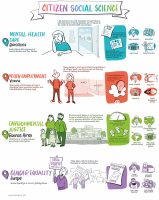
Figure 1. The European project CoAct is based on the idea of citizen social science understood as co-designed research promoted by groups with a shared social concern. The project includes three actions and an open call for projects. Experts in the field become co-actors in research projects addressing four major social challenges: mental health, youth unemployment, environmental justice, and gender equality.
At the time of writing this paper, the co-researchers are sharing personal experiences to gain a better understanding of social support networks. Their stories will be included in a chatbot open to all citizens, which will listen and respond to their narrations. This work reinterprets chatbots’ artificial intelligence and reinforces a collective intelligence that tries to learn what experiences we share and who we share them with, find solutions to certain doubts raised by co-researchers, discover the individual roles within social support networks, and identify the most valuable resources within these networks. In 2022, the data will be collectively interpreted in a citizen parliament format, together with organisations from the knowledge coalition. The goal is to provide citizen science with scientific value, as well as with individual value for each of the individuals involved and value as a catalyst for collective action and public policies through properly argued measures and recommendations.
«Some research staff have chosen to refocus their work to incorporate citizen participation to their research practice to provide it with civil commitment»
Similar processes have started in Vienna and Buenos Aires, albeit on different topics and in different contexts. In Vienna, groups of young persons at risk of exclusion will co-research to gain new knowledge to discuss and improve training and facilitate job placement. In Buenos Aires, persons living in precarious homes next to a highly polluted river, with no access to drinking water, will build and feed their observations into environmental quality indicators. Everyday cases and their perceptions will be the basis to create protocols and indicators that better suit the interests and needs of the local community by collectively mapping environmental quality along the 64 kilometres of the Matanza Riachuelo river. An open call, mainly for third-sector organisations, will allow to validate CoAct’s research process at a different level.
The members of the CoAct consortium come from very different scientific disciplines and backgrounds. Therefore, the same project offers the opportunity to keep a plurality of perspectives when delving into academically relevant citizen social science that can also generate actionable results. CoAct’s approach reviews, adapts, and incorporates practices that already have some tradition within social sciences, such as community-based research and participatory action research, apart from others from artists with experience working with communities (Perelló, Cigarini, et al., 2020).
Wilder research
In fact, beyond CoAct, some research staff have chosen to refocus their work to incorporate citizen participation to their research practice to provide it with civil commitment. Behind each initiative, there is always a particular history, and each field of knowledge can also give life to a different citizen science. More specifically, in computational social science and complexity sciences (Perelló et al., 2012; Sagarra et al., 2016) there is a need to overcome the current opaque data sources (with social networks as the main paradigm, using data from technological companies) and come up with a wilder type of research (outside the laboratory, one that is more representative and closer to everyday life). Laboratory work needs to simplify reality and decontextualise it somehow, which is useful to build universal and reproducible knowledge, but can also fail in its desire to address and help address immediate social challenges.
«Some citizen science projects have successfully empowered their participants»
Circling back to the quote from Irwin (1995), some potential questions would be: What mechanisms must be activated in academic research to «respond to the concerns and needs of citizens»? Is it possible to publish research in high-impact academic journals including reliable scientific knowledge produced by citizens? A positive answer to these questions would greatly improve scientific research. Professional scientists feel their way through research the best they can, but they actually lack prior training to ensure their success. In addition, and especially in the Spanish context, scientific infrastructures suffer stress when they try to implement some unexpected, extremely delicate aspects from citizen science projects, such as participant privacy or research ethics in relation with the EU General Data Protection Regulation (GDPR), as well as responsible research and innovation frameworks and open science in a broad sense.
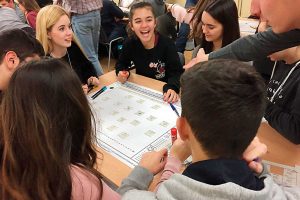
Taking research to public spaces – such as the street or schools – helps the persons who occupy these spaces to define the research topic and the most relevant research questions, and will also interpret the data. In the picture, co-creation session with fourth-year secondary school students from the Sant Gabriel School in Viladecans (Barcelona, Spain), within the StemForYouth project. / Photo: OpenSystems
However, some citizen science projects have successfully empowered their participants. Participatory dynamics are organised so that their voice can be better heard and taken into account across all phases of a research project (Senabre et al., 2018). Research can be co-defined using co-creation strategies with particularly concerned groups and collectives. Data collection protocols and even their process of interpretation can also be open to discussion and debate. The same evidence can have a different meaning depending on the reader, and some results can be more relevant than others when we take into account the different perspectives of the participants. In specific dynamics and spaces, scientific research can be enriched and produce better and more original results. This overcomes the subsidiary role of those who participate in citizen science projects and shapes a research that can also work outside the academic environment to provide knowledge for each and everyone involved. Every participant’s contributions are on the same level and all efforts are recognised, wherever they may come from.
Air quality and the families in a neighbourhood
The xAire project is an example of how important it is to expand participation spaces and how critical it can be to increase the social dimension of research. It is a collective mapping of Barcelona’s air quality which has managed to measure the concentration of nitrogen dioxide in 725 different spots (Perelló, Cigarini et al., 2020). The initiative is led by our group, OpenSystems, together with other institutions, also from the cultural sphere. The Contemporary Culture Centre in Barcelona (CCCB) included the project in their exhibition «After the end of the world».
«With specific dynamics and spaces, scientific research can be enriched and overcome the subsidiary role of those who participate in citizen science projects»
The number of spots in the city analysed by the xAire project is unprecedented. The data show the high variability of pollution and make it possible to reliably and accurately evaluate its impact on public health. The test tubes were carefully placed by the families of the students in 18 primary schools of the city’s ten districts. The groups of families in each school decided the location independently, following the same protocol. The quality of the results is inseparable from the commitment and personal and collective interest of the more than 1,600 participants. They wanted to know the concentration of nitrogen dioxide in their streets. The data gave them irrefutable arguments to urge the city council to take steps to reduce pollution. All these benefits came together with educational reasons, which were the starting point of xAire, thanks to the Barcelona Education Consortium. The students’ motivation and learning was observed to improve, because they were participating in a «real» scientific research project. This has also been seen in other citizen science experiences (Perelló et al., 2017).
Street experiments
We will now delve into other nuances of citizen social science from the perspective of computational social science and complexity sciences. OpenSystems has also formalised public experiments that try to respond to localised and contextualised social concerns (Sagarra et al., 2016). Using digital devices (Vicens, Perelló, et al., 2018), laboratory methodologies take to the streets. The experiment transforms into an experience thanks to an urban listening device. Passers-by and neighbours who want to participate reflect for some minutes about an issue related to a shared concern in the community, collective, or specific group of citizens. People cease to be mere passive experimental subjects and the obtained data are valuable at least for the community behind the project, formed by people who want to know the reaction of their fellow citizens to a specific social problem.
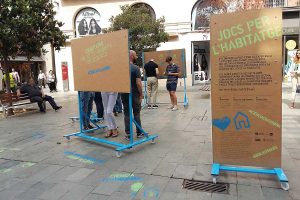
Street experiments allow passers-by and neighbours who want to participate to reflect for some minutes about an issue related to a shared concern in the community, collective, or specific group of citizens. People cease to be mere passive experimental subjects and the obtained data are valuable at least for the community behind the project, formed by people who want to know the reaction of their fellow citizens to a specific social problem. In the picture, one of the interventions for the Jocs per l’Habitatge (“Games for Housing”) project in Granollers (Barcelona, Spain).
The results were valuable to highlight inherent inequities in climate change action (Vicens, Bueno-Guerra, et al., 2018), the different social roles in community mental health care (Cigarini et al., 2018), or gendered aspects of street social interactions (Cigarini et al., 2020), to mention just a few examples that have already been published in high-impact scientific journals.
«Co-creation spaces can be schools, prisons, or libraries and their communities (groups of classmates, inmates, or users)»
Co-creation spaces can be schools, prisons, or libraries and their communities (groups of classmates, inmates, or users). And the people who occupy these spaces are the ones who help define the research topic and the most relevant research questions, and will also interpret the data, together with the scientists. Meanwhile, the public spaces for the experiments can be game festivals (DAU Barcelona in several editions), street art festivals (FiraTàrrega 2017, in their opening show, or Escena Poblenou 2018), or science festivals (the science biennial organised by the Culture Institute of Barcelona, with the collaboration of a theatre company and a school of design). But they can also pop up for a few days or hours on the busiest boulevards or squares.
The social dimension of citizen science
Finally, there is a growing awareness of the social and political impact of science, both present and potential. Citizen science, ambitious by nature, is assuming the responsibility to vertebrate the always complex interaction between research, society, and policy-making in areas such as sustainability (Fritz et al., 2019; Sauermann et al., 2020). The democratic promise that characterises citizen science narrative, more inclusive and social, is based on the idea that scientific knowledge is constructed socially and thus these practices allow the citizens to direct research towards societal needs (Irwin, 1995).
However, citizen social science still has a long road to walk. The will and desire to research are more common than specific facts and experiences. Nevertheless, building a citizen social science will be a worthy journey for all the people involved. For professional scientists, it is a shift towards shared research, which is inconceivable without listening, debating, and acting with concerned collectives, communities, and individuals. Let us hope that citizen social science will increase democracy and social cohesion, without turning a blind eye towards minorities or those in a more vulnerable situation. Looking at the times of instability and provisionality that we are living, trans-disciplinary, co-designed research driven by groups with a shared social concern seems to be vitally important.
References
Auerbach, J., Barthelmess, E. L., Cavalier, D., Cooper, C. B., Fenyk, H., Haklay, M., Hulbert, J. M., Kyba, C. C. M., Larson, L. R., Lewandowski, E., & Shanley, L. (2019). The problem with delineating narrow criteria for citizen science. Proceedings of the National Academy of Sciences, 116(31), 15336–15337. https://doi.org/10.1073/pnas.1909278116
Bonhoure, I., Cigarini, A., Vicens, J., & Perelló, J. (2019). Citizen social science in practice: A critical analysis of a mental health community-based project. SocArXiv Papers. https://doi.org/10.31235/osf.io/63aj7
Cigarini, A., Vicens, J., Duch, J., Sánchez, A., & Perelló, J. (2018). Quantitative account of social interactions in a mental health care ecosystem: Cooperation, trust and collective action. Scientific Reports, 8(1), 3794. https://doi.org/10.1038/s41598-018-21900-1
Cigarini, A., Vicens, J., & Perelló, J. (2020). Gender-based pairings influence cooperative expectations and behaviours. Scientific Reports, 10(1), 1041. https://doi.org/10.1038/s41598-020-57749-6
Fritz, S., See, L., Carlson, T., Haklay, M., Oliver, J. L., Fraisl, D., Mondardini, R., Brocklehurst, M., Shanley, L. A., Schade, S., Wehn U., Abrate, T., Anstee J., Arnold, S., Billot, M., Campbell, J., Espey, J., Gold, M., Hager, G., ... & West, S. (2019). Citizen science and the United Nations Sustainable Development Goals. Nature Sustainability, 2(10), 922–930. https://doi.org/10.1038/s41893-019-0390-3
Haklay, M., Fraisl, D., Greshake Tzovaras, B., Hecker, S., Gold, M., Hager, G., Ceccaroni, L., Kieslinger, B., Wehn, U., Woods, S., Nold, C., Balázs, B., Mazzonetto, M., Rüfenacht, S., Shanley, L., Wagenknecht, K., Motion, A., Sforzi, A., Riemenschneider, D., ... Vohland, K. (2020). Contours of citizen science: A vignette study. SocArXiv. https://doi.org/10.31235/osf.io/6u2ky
Irwin, A. (1995). Citizen science: A study of people, expertise and sustainable development. Routledge.
Kullenberg, C., & Kasperowski, D. (2016). What is citizen science? – A scientometric meta-analysis. PloS ONE, 11(1), e0147152. https://doi.org/10.1371/journal.pone.0147152
Parrish, J. K., Jones, T., Burgess, H. K., He, Y., Fortson, L., & Cavalier, D. (2019). Hoping for optimality or designing for inclusion: Persistence, learning, and the social network of citizen science. Proceedings of the National Academy of Sciences, 116(6), 1894–1901. https://doi.org/10.1073/pnas.1807186115
Perelló, J., Cigarini, A., Vicens, J., Bonhoure, I., Rojas-Rueda, D., Nieuwenhuijsen, M. J., Cirach, M., Daher, C., Targa, J., & Ripoll, A. (2020). Large-scale citizen science provides high-resolution nitrogen dioxide values and health impact while enhancing community knowledge and collective action. SocArXiv Papers. https://doi.org/10.31235/osf.io/4snhf
Perelló, J., Ferran-Ferrer, N., Ferré, S., Pou, T., & Bonhoure, I. (2017). High motivation and relevant scientific competencies through the introduction of citizen science at Secondary schools. In C. Heredotou, M. Sharples, & E. Scanlon (Eds.), Citizen inquiry (p. 150–175). Routledge. https://doi.org/10.4324/9781315458618
Perelló, J., Mayer, K., Franzen, M., Arza, V., & Albert, A. (2020). Citizen social science – active citizenship versus data commodification. Humanities & Social Sciences Communications. https://www.nature.com/collections/cihfchiheh
Perelló, J., Murray-Rust, D., Nowak, A., & Bishop, S. R. (2012). Linking science and arts: Intimate science, shared spaces and living experiments. The European Physical Journal Special Topics, 214(1), 597–634. https://doi.org/10.1140/epjst/e2012-01707-y
Sagarra, O., Gutiérrez-Roig, M., Bonhoure, I., & Perelló, J. (2016). Citizen science practices for computational social science research: The conceptualization of pop-up experiments. Frontiers in Physics, 3, 93. https://doi.org/10.3389/fphy.2015.00093
Sauermann, H., Vohland, K., Antoniou, V., Balázs, B., Göbel, C., Karatzas, K., Mooney, P., Perelló, J., Ponti, M., Samson, R., & Winter, S. (2020). Citizen science and sustainability transitions. Research Policy, 49(5), 103978. https://doi.org/10.1016/j.respol.2020.103978
Senabre, E., Ferran-Ferrer, N., & Perelló, J. (2018). Participatory design of citizen science experiments. Comunicar, 54, 29–38. https://doi.org/10.3916/C54-2018-03
Tauginienė, L., Butkevičienė, E., Vohland, K., Heinisch, B., Daskolia, M., Suškevičs, M., Portela, M., Balázs, B., & Prūse, B. (2020). Citizen science in the social sciences and humanities: The power of interdisciplinarity. Palgrave Communications, 6, 89. https://doi.org/10.1057/s41599-020-0471-y
Tornasi, Z., & Delaney, N. (Eds.). (2020). Citizen science and citizen engagement. European Comission. https://doi.org/10.2777/05286
Vicens, J., Bueno-Guerra, N., Gutiérrez-Roig, M., Gracia-Lázaro, C., Gómez-Gardeñes, J., Perelló, J., Sánchez, A., Moreno, Y., & Duch, J. (2018). Resource heterogeneity leads to unjust effort distribution in climate change mitigation. PloS ONE, 13(10), e0204369. https://doi.org/10.1371/journal.
pone.0204369
Vicens, J., Perelló, J., & Duch, J. (2018). Citizen Social Lab: A digital platform for human behavior experimentation within a citizen science framework. PloS ONE, 13(12), e0207219. https://doi.org/10.1371/journal.pone.0207219
Vohland, K., Land-Zandstra, A., Ceccaroni, L., Lemmens, R., Perelló, J., Ponti, M., Samson, R., & Wagenknecht, K. (Eds.). (2021). The science of citizen science. Springer International Publishing.



